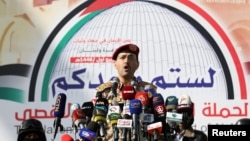Yemen is in the midst of one of the world’s largest humanitarian crises. Nine years into a civil war, the country’s economy is on the verge of collapse, as is the health system, according to the United Nations. Around 19.5 million people in Yemen will require aid next year, a seven percent increase compared with 2024, while 49 percent of Yemenis, or some 17 million people will face severe food insecurity, and 3.5 million of whom will experience acute malnutrition.
Ultimately, the root cause of the crisis is years-long fighting between the government of Yemen and Houthi militants. Barring a political settlement, the crisis will continue and even worsen.
On December 23 of last year, the Yemeni government and the Houthi rebel group committed to a set of measures to implement a nation-wide ceasefire, in preparations for the resumption of an inclusive political process under UN auspices.
However, the Houthis have continuously undermined the process. “They have ignored the clear demands in [United Nations] Resolution 2722 to end their maritime attacks,” said U.S. representative to the United Nations, Linda Thomas-Greenfield.
“On the contrary, the Houthis, with the help of Iranian supplied anti-ship ballistic missiles, have only continued their reckless attacks– including on U.S. naval ships, a Turkish merchant vessel, and a UAE-operated container vessel. And they continue to target Israel.”
“The multinational community stands firm in our resolve to counter threats to navigational rights and freedoms,” said Ambassador Thomas-Greenfield.
To that end, the United States supports mitigating the flow of weapons to Yemen by strengthening the capacity of the UN Verification and Inspection Mechanism for Yemen to inspect vessels bound for Houthi-controlled ports.
“Right now, these transfers are happening at an unprecedented rate, not to mention, in violation of multiple Security Council resolutions. This must cease,” she said. “What’s more, and following the successful launch of the Yemen Maritime Security Partnership last month, we will continue to work with the Republic of Yemen’s Coast Guard to control illicit activity along the country’s coastline.”
“Rather than continue their assault on the Red Sea and surrounding waterways,” said Ambassador Thomas-Greenfield, “the Houthis must de-escalate and return to a political process. One that achieves a durable end to the conflict. One that addresses Yemeni calls for justice, accountability, and redress for human rights abuses and violations.”






